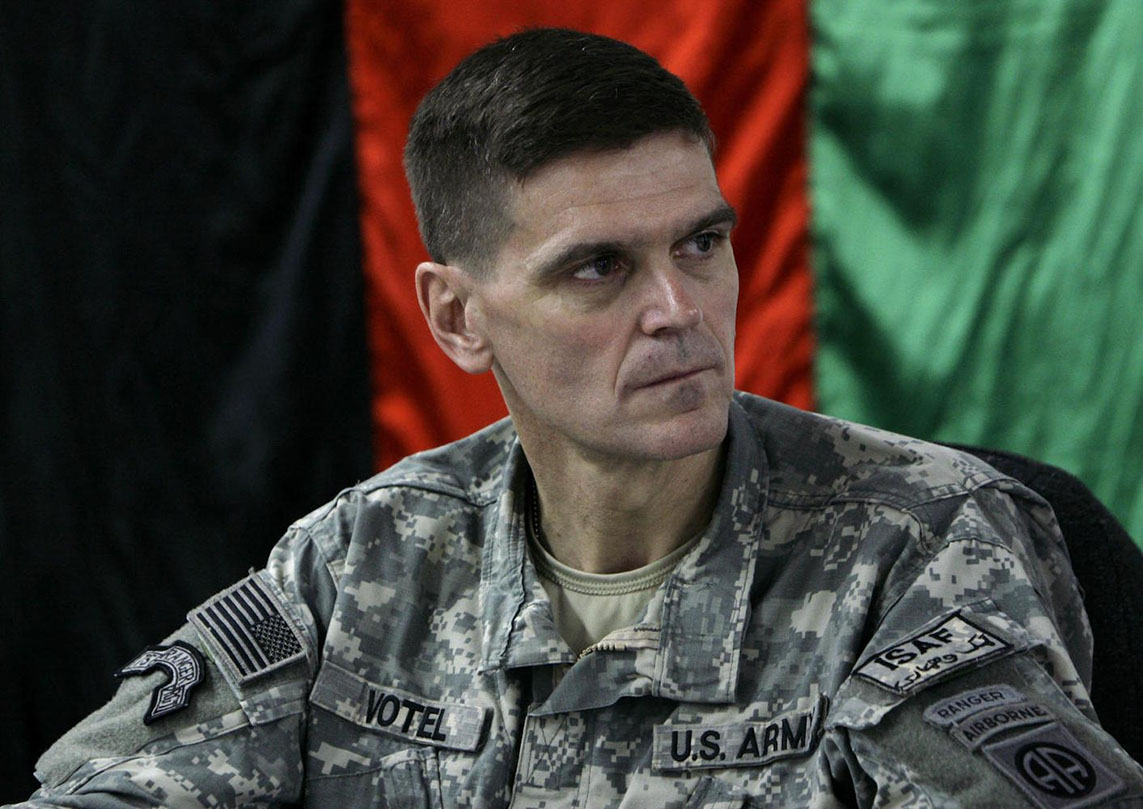US Top Military Leader Visited Syria: Preparing for Raqqa Offensive
ANDREI AKULOV
Strategic Culture
Gen. Joseph Votel, commander of United States Central Command, secretly visitednorthern Syria to meet US military advisors working with Syrian fighters and leaders of the Kurdish-led Syrian Democratic Forces (SDF), an umbrella group of about 25,000 Kurdish and around 5,000 Arab fighters backed by the United States.
The US is training fighters to retake Raqqa, the Islamic State’s (IS) self-declared capital.The meetings included discussions with top SDF officials who are asking for arms and ammunition. Votel’s visit comes after international talks on ending the Syrian conflict broke up with no clear breakthrough last week as new faction-fighting erupted and the death toll continued to mount.
Votel is the highest-ranking United States military official to travel to Syria during the war. The last known high-level US official to visit the war-torn country was Brett McGurk, Obama’s envoy to the coalition fighting IS, who spent two days in Syria in late January
Votel’s predecessor, Gen Lloyd Austin, who was leading Central Command when the US began airstrikes in Syria in September 2014, never visited Syria. Votel’s decision to go reflects his emphasis on getting an up-close look at all aspects of the counter-IS campaign early in his tenure.
The visit comes as the first of 250 additional US special operations forces are beginning to arrive in Syria to work with local forces.
Qarhaman Hasan, SDF’s deputy commander, said he has submitted to the US a list of pressing requirements, including armoured vehicles and heavy weapons, including machine guns, rocket launchers and mortars. “We are creating an army,” Hasan said, and have to rely on smuggling to get weapons. “You can’t run an army on smuggling,” headded.
Brett McGurk, confirmed that Votel’s visit to Syria comes in preparation for a Raqqa offensive against the Islamic State group.
IS militants broadcast announcements, that civilians will be allowed to flee Raqqa to its countryside, after planes of the international coalition dropped flyers on the city on May 19, advising residents to go. It was the first time the coalition has dropped notices asking residents to leave their homes. Meanwhile Kurdish forces have established a stronghold about 37 kilometers (23 miles) north of Raqqa.
There is no doubt the operation to free Raqqa will start soon.
“We are ready to coordinate our actions with the Americans, because Raqqa is in the eastern part of Syria, and the American coalition is mainly … acting there,” Interfax quotedRussian Foreign Minister Sergey Lavrov as saying in an interview with the Ren-TVtelevision channel.
“Perhaps, this is no secret, if I say that at some stage the Americans suggested performing a ‘division of labor’: the Russian Air Forces should concentrate on the liberation of Palmyra, and the American coalition with Russian support will focus on the liberation of Raqqa,” the Minister added. But the US refuses the offer of support just as itrefused to deliver joint strikes against al-Nusra violating the declared truce in Syria.
The United States is not planning any joint operations with Russia to liberate the Syrian city of Raqqa from Islamic State, US Department of Defense spokesperson Lt. Col. Michelle Baldanza said on May 20. “We are not planning any operations with Russia to jointly liberate Raqqa from Islamic State (IS) control. In Syria, our focus remains on equipping and enabling local, motivated forces who can take the fight to IS,” Baldanza explained.
The US wants to establish a territorial sphere of influence in the areas of northeastern Syria controlled by the SDF.
A looming US-backed offensive on Raqqa carries huge political significance for the outgoing Obama administration. In March, Russian President Vladimir Putin scored a political victory by ousting IS militants from Palmyra. The US-backed offensive to liberate Raqqa could be an attempt to score a similar victory for the Obama administration before his presidential term ends this year.
A major constraint regarding the operation to liberate Raqqa is Turkey with its concern over the growing strength of the Kurdish fighters. For Turkey, the Syrian Democratic Forces comprise a proxy of the Kurdish underground. Ankara opposes Kurdish control of the Syrian side of the border crossings. The US will have to tackle the problem.
The fall of the city of Raqqa, which is considered to be IS’ capital, is still a long way off. Raqqa is like the Berlin Reichstag during WWII, the fall of which would mean the destruction of IS’ core. Russia and the US have a common goal. Joining forces would be a natural thing to do. The two powers have a history of fighting a common enemy together. Coordination of efforts and information exchange could significantly reduce casualties. Joining together could greatly improve the bilateral relations. The US says “no” as ambitions prevail over reason and expediency.
